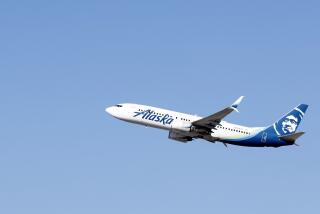Retaliate Against Terror, Flight 103 Panel Advises
- Share via
WASHINGTON — A presidential commission that investigated the bombing of Pan American Airways Flight 103 urged the United States on Tuesday to retaliate for acts of terrorism by launching military strikes or other punitive steps against terrorists and the nations that support them.
While the panel sidestepped the question of whether such action ought to be directed at Iran and Syria, the suspected sponsors of the 1988 attack, commission Chairman Ann Dore McLaughlin declared: “When the perpetrators are found, they should be punished.”
The commission also concluded that a deeply flawed aviation security system leaves the nation vulnerable to terrorist attack. It blamed Pan Am and the Federal Aviation Administration for failing to enforce requirements that it said could have prevented the catastrophic bombing.
And in a blow to what had been touted as a promising new safeguard, the panel urged the government to halt deployment of hundreds of bomb detectors in airports around the world. It concluded that the costly devices are incapable of detecting sophisticated plastic explosives in the small quantity that blew the London-to-New York jetliner and its 259 crew members and passengers from the sky.
The 182-page document, drafted by a highly respected team that included four members of Congress, offered a sweeping menu of reforms that it said could help the nation better fend off such terrorist attacks in the future.
But in a grim conclusion certain to reopen a national debate, the commission warned that such attacks will end only if the United States takes aggressive new steps to strike back against terrorists and their sponsors--even if available evidence falls short of criminal standards of proof.
To that end, it recommended that the Bush Administration prepare to launch direct military strikes against terrorist hideouts abroad. When such action appears inappropriate, it urged that the government authorize covert operations against the targets.
“State-sponsored terrorism must be faced and must be deterred--with methods that are consistent with the nature of the threat and the U.S. system,” said the commission report, presented to President Bush by McLaughlin, a former secretary of labor.
McLaughlin disclosed that the commission delivered to the President a separate memorandum outlining more specific recommendations about an appropriate U.S. response for the Pan Am attack. But the chairman declined further comment, saying that the panel’s advice would remain confidential.
The public call for retaliation won praise from most American family members of those killed in the Pan Am 103 attack, but it was criticized by some British relatives of those who perished when the jetliner crashed in Lockerbie, Scotland, on Dec. 21, 1988, killing 11 on the ground in addition to those on the plane.
At the White House, spokesman Marlin Fitzwater declined to comment on specific recommendations, but he said: “We certainly agree that we need to be as aggressive as necessary to fight terrorism.”
U.S. intelligence officials believe that the Pan Am 103 bombing was carried out by a Palestinian guerrilla leader with the support of Iran and, to a lesser extent, Syria. But the seven-member President’s Commission on Aviation Security and Terrorism drew no public conclusions about responsibility for the attack.
Instead, with a focus on how the bombing occurred, it found fault at nearly every level with the system designed to protect American air passengers from terror in the sky. Among other conclusions, the panel found that:
Pan Am, in violation of FAA regulations, routinely neglected at its high-risk airport in Frankfurt, Germany, to hand-search luggage not accompanied by a passenger on the plane.
The FAA appeared to have condoned the security violations and never disciplined Pan Am, even though its investigators warned before the Pan Am attack that the airline’s security system in Frankfurt was “held together only by . . . the tenuous threads of bad luck.”
Luggage from Pan Am 103 was left unguarded on a Heathrow Airport tarmac for more than half an hour before being loaded aboard a Boeing 747 for the London-to-New York leg of the flight, which originated with another plane in Frankfurt.
In contending that the disaster could have been prevented, the McLaughlin commission said that more aggressive measures might have intercepted the bomb, secreted inside a Toshiba radio-cassette player, before it was loaded onto the plane.
The commission found that at least one piece of unaccompanied luggage was loaded onto the flight in Frankfurt after only an X-ray search--a technique incapable of detecting the deadly Semtex plastic explosive hidden inside the radio.
The commission reported that the Pan Am security breach in Frankfurt “incredibly” persisted for nearly nine months after the bombing.
But the panel aimed most of its criticism more broadly.
“Terrorists were able to place a bomb on Pan Am 103 not because some one thing failed, but because the aviation security system failed,” McLaughlin said. “The system was flawed and did not provide an effective defense against sabotage.”
FAA Administrator James Busey said that he welcomed the report, although he objected to some of the adjectives used to describe the agency.
“The system was flawed,” said Busey, who took over the FAA several months after the bombing. “Mistakes were made. I want to own up to those mistakes.”
Pan Am Chairman Thomas Plaskett noted that he disagreed with some of the commission’s criticisms of the airline but said that the report made several positive recommendations.
In recommending that the FAA halt its $175-million program to supply Thermal Neutron Analysis bomb-detection machines to 150 airports around the world, the commission said that it believes the devices cannot detect small but deadly quantities of plastic explosive without an unacceptably high rate of false alarms.
But Busey, the FAA administrator, said that the agency plans to persist with the program.
More to Read
Sign up for Essential California
The most important California stories and recommendations in your inbox every morning.
You may occasionally receive promotional content from the Los Angeles Times.













